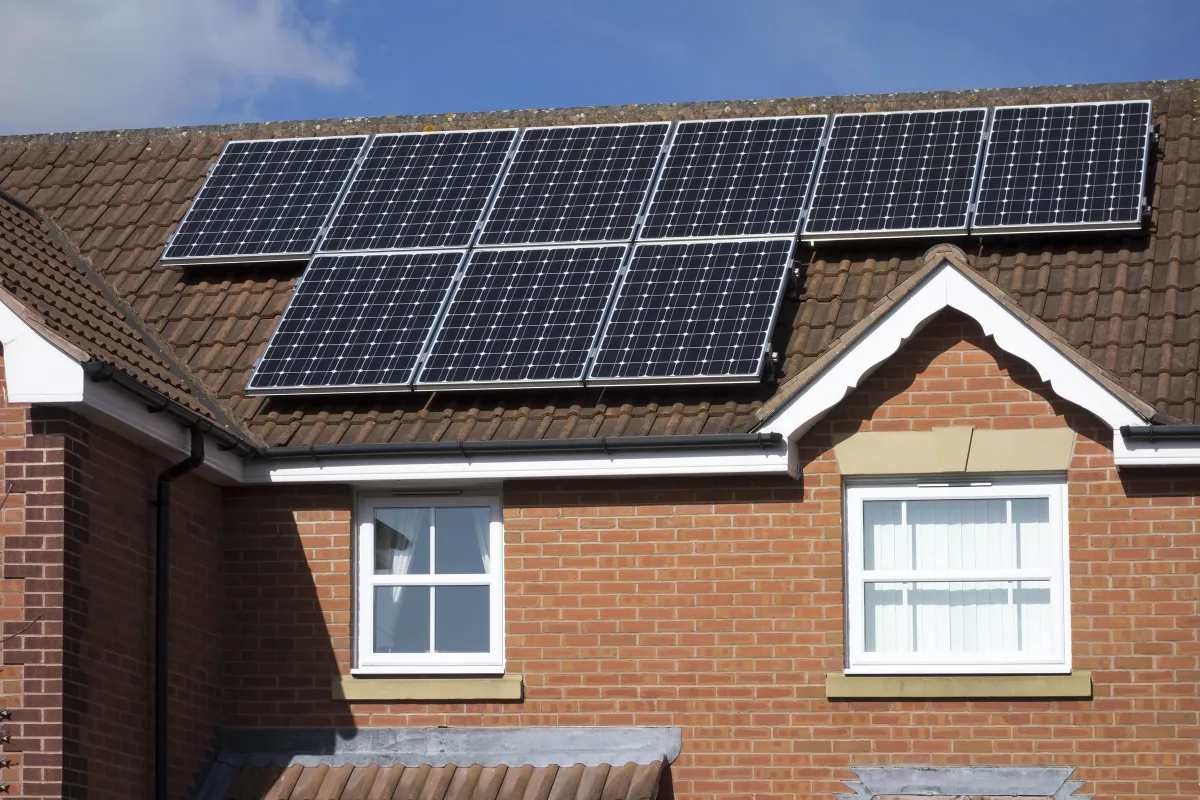Solar Panels & Battery Storage
Reduce Your Energy Costs With Environmentally Friendly Electricity
Solar Panels & Battery Storage
Reduce Your Energy Costs With Environmentally Friendly Electricity
Power Your Home With Energy From The Sun Get Paid For The Energy You Don't Use
Power Your Home With Energy From The Sun Get Paid For The Energy You Don't Use
From April 2022 to 2027, homeowners will pay 0% VAT on solar panels
You maybe eligible for solar panels through the ECO4 Government backed scheme
Lower your homes CO2 emissions & potentially increase its saleable value
Enjoy the benefits of generating your green energy
The Smart Export Guarantee typically pays homeowners up to £159 per year

From April 2022 to 2027, homeowners will pay 0% VAT on solar panels
You maybe eligible for solar panels through the ECO4 Government backed scheme
Lower your homes CO2 emissions & potentially increase its saleable value
Enjoy the benefits of generating your green energy
The Smart Export Guarantee typically pays homeowners up to £159 per year
How Can Eco-4 Government Backed Grants Help Me?
Homeowners or private tenants receiving qualifying benefits since April last year are likely eligible for support from energy suppliers.
In case your home's heating system is powered by electricity, such as an electric boiler or air source heat pump, it might be possible for you to obtain solar panels through the ECO4 program.
To qualify for this government-funded initiative, which commenced in July 2022 and will continue until March 2026, you need to fulfil any of these eligibility criteria: your household earns an annual income of less than £31,000, you have been referred by your energy provider, local authority, or doctor, or you receive specific benefits.
Prior to receiving solar panels, your residence must have insulation installed to a specific standard, which implies that you may be eligible for insulation through the program as well.

How does Battery Storage work with Solar?
Battery storage works with solar by storing excess electricity generated by solar panels during the day when the sun is shining. The stored electricity can then be used at night or during periods of low sunlight, effectively extending the use of solar-generated energy beyond daylight hours. The battery can also charge from the grid during off-peak hours when electricity is cheaper and discharge during peak hours when electricity is more expensive, helping to save money on electricity bills. Battery storage can also provide backup power in case of power outages, ensuring that homes can continue to run on stored energy. Overall, battery storage can help to maximise the benefits of solar energy by providing greater control and flexibility over electricity usage.
Here are five key benefits to installing solar storage batteries in the UK
Solar storage batteries can help homeowners save on their electricity bills by storing excess solar energy generated during the day and using it during peak hours, reducing their dependence on the grid.
Increased energy independence: Solar storage batteries can provide backup power during power outages, ensuring that homes can continue to run on stored energy.
Solar energy is a clean and renewable source of energy, and by storing excess solar energy, homeowners can reduce their reliance on fossil fuels and reduce their carbon footprint, whilst taking advantage of SEG (Smart Export Guarantee) and sell unused energy back to the Energy Supplier
With the uncertainty of the grid and rising energy prices, installing solar storage batteries provides an additional layer of energy security, giving homeowners greater control over their energy usage.
Installing solar storage batteries can increase the value of a home, as it is an attractive feature for potential buyers who are looking for homes with energy-efficient and sustainable features.

What is solar battery storage?
Solar battery storage is the process of storing excess solar energy generated by solar panels during the day for use during times of low solar generation, such as at night or during periods of cloudy weather.
How does solar battery storage work?
Solar battery storage works by converting the DC electricity generated by solar panels into AC electricity, which can then be stored in a battery. When there is a demand for electricity, the battery releases the stored energy back into the home or grid.
What are the benefits of solar battery storage?
Solar battery storage can provide a number of benefits, including reducing electricity bills by using stored energy during peak hours when energy prices are higher, providing backup power during power outages, and reducing reliance on the grid.
What types of batteries are used for solar battery storage?
The most common types of batteries used for solar battery storage are lithium-ion batteries, which are lightweight, compact, and have a high energy density. Other types of batteries used for solar storage include lead-acid batteries and flow batteries.
How long do solar batteries last?
The lifespan of a solar battery can vary depending on the type of battery and how it is used. Lithium-ion batteries typically last between 10 and 15 years, while lead-acid batteries last between 3 and 5 years.
Can I install solar battery storage on my own?
Installing a solar battery storage system is a complex process that must be done by a qualified professional. An MCS certified electrician or solar installer can provide guidance and ensure the system is installed safely and properly.








